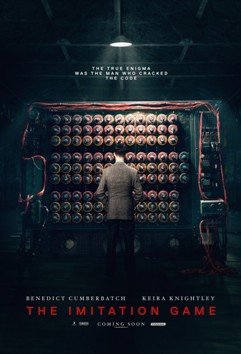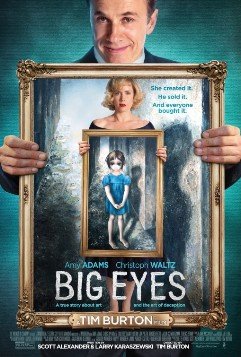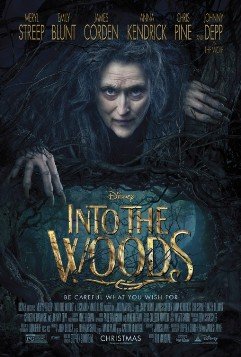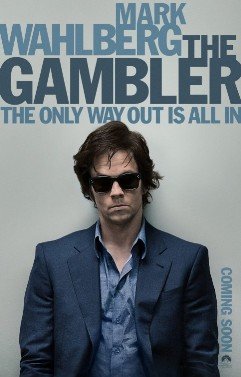December 26, 2014, - 3:50 pm
Christmas Box Office: Unbroken, The Imitation Game, Big Eyes, Into the Woods, The Gambler
And the end of a bad year in new movies goes out with a whimper. The only one of the movies, new in theaters yesterday, that I liked was the gay WWII hero movie. And even that was all relative in a year of really shabby movies. Oh, and by the way, those who claim “patriotism” got snubbed because neither “Unbroken” nor “American Sniper” got nominated for any awards–well, they are dead wrong. I myself did not vote for either of these in any category, as a member of the Detroit Film Critics Society, and–at least with regard to “Unbroken”–here’s why:





* “Unbroken“: You would think that a movie about an American World War II hero and patriot would be right up my alley (you would be right about that) and that I would love this movie, but you would be wrong. It would be very difficult for any director to screw up a movie about the inspiring, incredible life story of Louis Zamperini. But Angelina Jolie managed to bleep it up. Gone is the amazing, uplifting story depicted in the book of the same name. In its place, Jolie produces a long, boring, formulaic, stilted, distracting mess. I received the DVD screener for this movie a month ago. I was excited to watch it, but it was so slow and herky-jerky that I had to watch it in 15 minute installments, since it didn’t keep my attention.
The most noticeable disservice to the late Zamperini is that Palestina Jolie skips what may be the most interesting part of Zamperini’s life: his second (and third) acts. Maybe that is because she is a godless woman who doesn’t seem to like Christianity (or Judaism) much (but oh does she love Islam!). After he returned home from being tortured in a Japanese prison camp during the war, Zamperini retreated into a life of drunken carousing. But he heard Rev. Billy Graham deliver a sermon in person, and it changed his life. He became a devout Christian and started a camp for wayward boys, changing their lives. NONE of that is in the movie. None. Knowing that story and watching this long, drawn out, formulaic movie end, I thought, “Is that all there is?” I felt like I’d watched only half a movie. The only references to his future life are a brief line in the movie when Zamperini tells G-d he will devote his life to him if he is allowed to survive and in a caption at the end of the movie stating that he did devote his life to G-d. That’s it. The story is much bigger than those brief mentions.
And then there’s what I did watch. Jolie employs the device used by the most incompetent so-called directors. She constantly flashes back and forward and back and forward and back again. It’s dizzying, confusing, and just flat-out annoying. It wasn’t necessary and ruins the movie. The most interesting parts of Zamperini’s life are obfuscated and/or poorly told. Zamperini, after being a bad kid, is convinced by his older brother to become a disciplined runner and track star. When he makes Team USA and goes to compete at the “Hitler Olympics” in 1936, director Jolie shows some silly “We Are the World” scene of Zamperini and a Japanese athlete nodding at each other during the opening ceremony. She completely skips Zamperini’s meeting Hitler, because, hey, that’s not at all a big deal, right? The whole set of Olympic scenes, by the way, are in the endlessly distracting flashbacks.
And since she manages to make one of the potentially most interesting scenes into a bore, she then also makes what should have been one of the most boring things into something interesting, in a survival adventure movie kind of way that reminded me of Tom Hanks in “Castaway” or Robert Redford in “All is Lost” (read my review) or the Indian kid in “Life of Pi” (read my review). Zamperini and two other soldiers are shown adrift on two rafts in the middle of the sea for 45 days, struggling to survive. Compared to the lengthy scenes of Zamperini and two other soldiers in the raft, the scenes of Zamperini in the Japanese POW camp seem rote, like the directrix was bored. The movie was cold and lacks spirit, exactly like the personality of its director.
Jolie said she wanted the message of the movie to be that all people suffer in war, and she shows us scenes of the bombings of Hiroshima and Nagasaki. We are morally equivalent to the enemy. I get that’s the message. How sad that she doesn’t seem to get that it’s just not true. And if she feels that way, she should go live amidst the enemy and stop making bad movies.
Some people have pointed out that Zamperini was taken with Jolie. Well, so what? A 90-something old man is taken with a beautiful and very famous movie star? He wouldn’t be the first to be starstruck and happy just to have her make a movie about his life, no matter how boring and uncomprehensive the movie is. The only touching part of Jolie’s film is the part that she had no part in directing: real-life footage of Zamperini running with the Olympic torch down the streets of Japan.
A couple of weeks ago, in the endless hype for this, Tom Brokaw hosted an hour special on NBC about the life of Zamperini, Palestina Jolie, and the making of this movie. The parts about Zamperini combined were far more touching and infinitely more interesting than this multi-million dollar heap of film.
Like I said, it would be very hard to bleep up the Zamperini story as told in the book, “Unbroken.” But in the movie of the same name, Angie Voight managed to do just that. She says it’s an anti-war movie. And I believe her.
ONE REAGAN

Watch the trailer . . .
* “The Imitation Game“: While this is, among other things, a gay rights movie clothed in World War II intrigue and mystique, the people who made this know how to make a movie. It’s one of this year’s best. As a conservative, I don’t believe in special rights for gays, but I do believe that what you do in your bedroom is your business (so long as it’s not with kids, incompetents, or animals), and I oppose any form of persecution like the awful kind that is on display at the end of this film.
That said, this is a pretty decent movie, one of this year’s best, in a very bad field of them. And it’s the story of thinking outside the box (though the use of that phrase is now inside the box) and genius. It’s the story of those who think differently not letting the mainstream horde of sheep get them down or cause them to change. And more than all of these, it’s the story of a brilliant British man, Alan Turing (Benedict Cumberbatch), who broke the Nazi Enigma code and helped end World War II early, saving countless lives. He also invented the first computer.
This movie also employs flashbacks to Turing’s childhood as an odd duck who is endlessly mocked by classmates, has only one friend, and so on. You get the point. But unlike in Angelina Jolie’s “Unbroken,” the flashbacks are few and far between, and they are employed to make a point. Despite being a persecuted kid on the outs with others, he didn’t let that stop his different way of thinking or get him down. He persevered and thought great things, did great things.
He is chosen for a position on a squad of code breakers attempting to decipher the Nazi code to pilots and others. The code changes every 24 hours, so if it’s not solved by the end of the day, they have to start all over again. It’s frustrating work, and they aren’t making progress, until Turing convinces Winston Churchill to make him the director of the project, and he fires those who persecuted and attacked him. Turing creates a computer of sorts to break the code, but the computer isn’t making much progress. Soon, though, he hires people who solved a crossword puzzle he put in the newspaper. One of these is Keira Knightley, who inadvertently helps him figure it out.
She also becomes his girlfriend and fiancee until he tells her he is gay and that they can’t be married. This was back in the day when homosexual acts were against the law. Ultimately, none of his World War II heroics or genius matters. And it’s, in the end, a sad film because of the deplorable way Turing was treated.
Still, it’s an important movie about a lesser-known man who helped the West against the forces of evil and was a computer science pioneer. And it’s a great portrayal of the importance of rugged individualism and independent, critical thought–all of which Turing embodies in this movie.
Usually, science and math geniuses aren’t sexy enough for Hollywood, and so their stories aren’t told on the silver screen. I’m glad this was one of the exceptions to that rule.
THREE-AND-A-HALF REAGANS



![]()
Watch the trailer . . .
* “Big Eyes“: I always dislike reviewing movies about real-life people, as told from the point of view of only one of those people. You never know if the story is true. And this one is very heavy-handed, very over the top. Walter Keane, the villain in this movie, isn’t alive to defend himself. And the movie is told from the point of view of his ex-wife, Margaret Keane. The movie isn’t just heavy-handed. It’s heavy-handed feminism and it’s also anachronistic because even if everything that happens in this movie actually happened in real life, none of it would happen today.
The story: Margaret Keane (Amy Adams) is an artist and single mother. She paints portraits featuring big eyes (think “Bratz” dolls). You’ve probably seen her work, which became popular in the ’60s and ’70s. My late maternal grandmother had a “big eyes” painting, probably a knock-off or lithograph of Keane’s work, hanging in her basement. (I used to think it was soooo ugly and creepy-looking.) Keane meets another artist (or at least a man who pretends to be an artist) and eventually marries him. The man, Walter Keane, soon begins marketing and selling his new wife’s paintings as his own. And after being initially upset, she goes along with it. Walter turns the paintings into a huge marketing hit. They are soon everywhere, and the Keanes are making a mint. But Margaret is upset that she doesn’t get credit for her work and that her husband is abusive and constantly degrades her, plus he’s apparently an alcoholic. Ultimately, she leaves him and fights back with a vengeance (and this movie, told as she sees it). Gloria Steinem and the ghost of Betty Friedan are proud.
But is the story really true? Mainstream liberal media accounts discuss the lawsuit depicted in the movie, so that seems accurate, as does Margaret’s claim that she, not her husband, painted the pics. Still, I saw nothing confirming that Walter Keane was a violent, abusive, harmful person, threatening and attempting to burn Mrs. Keane and her daughter and their house down. Like I said, I hate reviewing these movies that seem over the top in depicting what may (or may not) have occurred in real life.
I don’t want to give away the whole movie, but you get the point. I wonder about the casting of Christoph Waltz as the Nebraska-born and American-raised Walter Keane. Waltz’s Austrian accent comes through crystal clear, and that is never explained in the movie, despite the fact that much of the movie takes place just a decade or two after World War II. It’s curious.
Like I said, the real Walter Keane is long dead and not around to give his side of the story, which–in past press accounts quoting him–was quite different than what you see here. So, if you go see this agenda-laden, ax-grinding movie, keep in mind that it’s propaganda neatly wrapped in Hollywood’s “You go girl!” grrrl-power-narrative bow.
And you’ll never know the whole story. Or the real one.
FOUR BETTY FRIEDANS PLUS FOUR MICHELLE LAVAUGHN ROBINSON HUSSEIN OBAMA IDI AMIN DADAS




![]()




Watch the trailer . . .
* “Into the Woods“: While the “first act” of this movie is entertaining and engrossing, the second act is an anti-male bore. Copied from a Broadway musical of the same name, the movie takes several fairy tales–“Little Red Riding Hood,” “Cinderella,” “Jack and the Beanstalk,” etc.–and intertwines them, with the characters involving themselves in each other’s stories. Johnny Depp’s child-molester-like wolf in the “Little Red Riding Hood” story was just more than a little creepy, but I enjoyed the first half of the movie.
It’s all male characters, especially the princes (including the one Cinderella marries), are idiots, fools, and failures, fending off a female giant in the woods, that I got bored and turned off. That part was boring and typical Hollywood crap. And if you don’t like musicals (I do like them), you’ll hate this.
Oh, by the way, Meryl Streep is pretty true to character as a witch. She’s played one several times, and I get the feeling this ain’t just acting.
FOUR BETTY FRIEDANS PLUS FOUR MICHELLE LAVAUGHN ROBINSON HUSSEIN OBAMA IDI AMIN DADAS




![]()




Watch the trailer . . .
* “The Gambler“: Mainstream (liberal) movie critics are falling all over this movie in gushing unison. Not me. I don’t know what the point of this slow, boring, pathetic movie was . . . other than to give Mark Wahlberg yet another paycheck and pretend he’s a great arthouse, indie film actor. This is supposedly a remake of the 1974 James Caan star vehicle of the same name.
The story: Wahlberg is a college professor from a very rich family. But he keeps losing everything because he’s addicted to gambling. And even when his wealthy mother and loan sharks give him the money to pay off his gambling debts–and even when he’s hundreds of thousands of dollars ahead at the casino tables–he deliberately keeps making risky bets and gambles it all away. Therefore, a whole bunch of mobster and loan shark thug types are after him.
Oh, I forgot one other reason they musta made this movie: so they could show you a digustingly morbidly obese John Goodman wearing nearly no clothes in a schvitz joint, playing a pseudo-Jewish loan shark, who uses the word “schvartze” (Yiddish word for Black, usually derogatory). We are just 5.2 million people (and shrinking) in America. And they couldn’t resist yet another opportunity to implicate Jews as ugly, fat, racist cretins in a movie. Thanks, Hollywood.
THREE MARXES PLUS THREE OBAMAS



![]()
![]()
![]()
![]()
Watch the trailer . . .


thank you DS I was planning on seeing Unbroken but now I will plan on seeing The Imitation Game. I don’t go to the movies often because there is so much trash. Your reviews are, in my experience, reliable.
bobguzzardi on December 26, 2014 at 4:09 pm